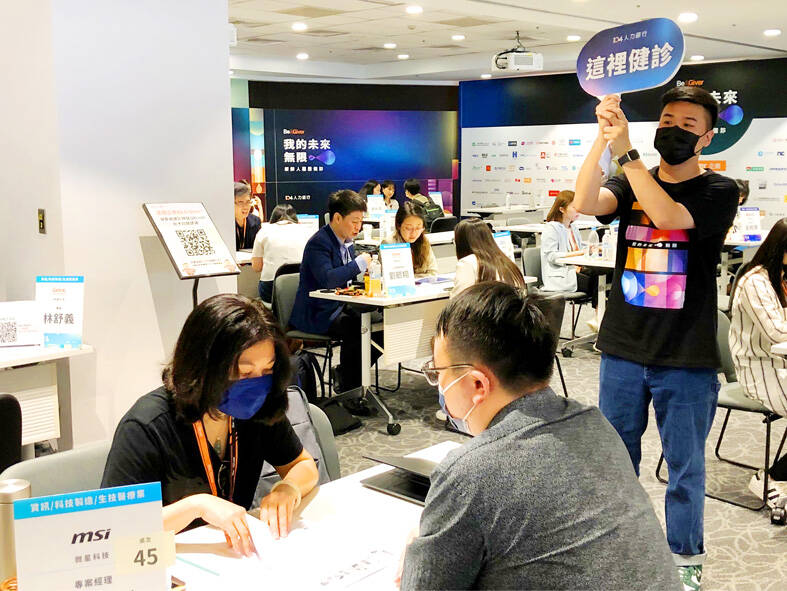The number of job vacancies hit 1.04 million this month, having remained above 1 million for the past nine straight months, as firms seek to secure sufficient workers ahead of the holiday season, the online 104 Job Bank (104人力銀行) said yesterday.
The number of vacancies represents an increase of 4.2 percent from the same time last year, with hotels and restaurants accounting for 215,000, retailers, direct selling and wholesale operators contributing 168,000, and electronics, software and semiconductor firms providing another 15,5000, the job bank said.
“It may become a new normal for job vacancies to exceed 1 million,” due to Taiwan’s rapidly aging population, the job bank said, adding that Taiwan’s population has declined for the past three consecutive years, with a record low of newborns at 138,000 last year.

Photo: CNA
If the trend remains unchanged, the workforce will downsize further, a phenomenon that is reinforced by changes in values among young people, it said.
Young people today do not consider it a virtue to follow their supervisors’ orders and assign less importance to loyalty, different surveys of the working population showed.
Young people also do not like to work overtime, considering their own wellness and rights to be more important. When forced to work overtime, young people tend to demand extra pay and fight to guard their rights and interests, it said.
Relative flexibility and freedom explain why young people prefer to work as couriers for e-commerce and food delivery service providers rather than making beds and waiting tables, it said.
An increasing number of employers have turned to middle-aged and elderly applicants to join their payroll, the job bank said in an earlier survey.
Such recruitment advertisements amounted to 194,000, making up 18.5 percent of the overall vacancies, 1.66 times higher than four years ago, it said.
The figures reveal that more than 50 percent of employers remain unwilling to hire middle-aged and older people, it said.
At the same time, 85 percent of middle-aged and elderly jobseekers said they still need to work for financial and other reasons and they care the most about working locations, followed by job requirements and wages, it said.
Labor-intensive manufacturers and service providers need to recognize middle-aged and elderly people are an importance human resource that can help relieve labor shortages, the job bank said.
The Ministry of Labor yesterday again rejected pleas by the hospitality sector to hire foreign workers to bolster their businesses, saying a continued mismatch between compensation offers and wage expectations account for their lack of manpower.
The nation’s labor pool remains underdeveloped and employers should adjust and offer better pay to deal with the matter, the ministry said.

Taiwan Semiconductor Manufacturing Co (TSMC, 台積電) secured a record 70.2 percent share of the global foundry business in the second quarter, up from 67.6 percent the previous quarter, and continued widening its lead over second-placed Samsung Electronics Co, TrendForce Corp (集邦科技) said on Monday. TSMC posted US$30.24 billion in sales in the April-to-June period, up 18.5 percent from the previous quarter, driven by major smartphone customers entering their ramp-up cycle and robust demand for artificial intelligence chips, laptops and PCs, which boosted wafer shipments and average selling prices, TrendForce said in a report. Samsung’s sales also grew in the second quarter, up

On Tuesday, US President Donald Trump weighed in on a pressing national issue: The rebranding of a restaurant chain. Last week, Cracker Barrel, a Tennessee company whose nationwide locations lean heavily on a cozy, old-timey aesthetic — “rocking chairs on the porch, a warm fire in the hearth, peg games on the table” — announced it was updating its logo. Uncle Herschel, the man who once appeared next to the letters with a barrel, was gone. It sparked ire on the right, with Donald Trump Jr leading a charge against the rebranding: “WTF is wrong with Cracker Barrel?!” Later, Trump Sr weighed

LIMITED IMPACT: Investor confidence was likely sustained by its relatively small exposure to the Chinese market, as only less advanced chips are made in Nanjing Taiwan Semiconductor Manufacturing Co (TSMC, 台積電) saw its stock price close steady yesterday in a sign that the loss of the validated end user (VEU) status for its Nanjing, China, fab should have a mild impact on the world’s biggest contract chipmaker financially and technologically. Media reports about the waiver loss sent TSMC down 1.29 percent during the early trading session yesterday, but the stock soon regained strength and ended at NT$1,160, unchanged from Tuesday. Investors’ confidence in TSMC was likely built on its relatively small exposure to the Chinese market, as Chinese customers contributed about 9 percent to TSMC’s revenue last

LOOPHOLES: The move is to end a break that was aiding foreign producers without any similar benefit for US manufacturers, the US Department of Commerce said US President Donald Trump’s administration would make it harder for Samsung Electronics Co and SK Hynix Inc to ship critical equipment to their chipmaking operations in China, dealing a potential blow to the companies’ production in the world’s largest semiconductor market. The US Department of Commerce in a notice published on Friday said that it was revoking waivers for Samsung and SK Hynix to use US technologies in their Chinese operations. The companies had been operating in China under regulations that allow them to import chipmaking equipment without applying for a new license each time. The move would revise what is known